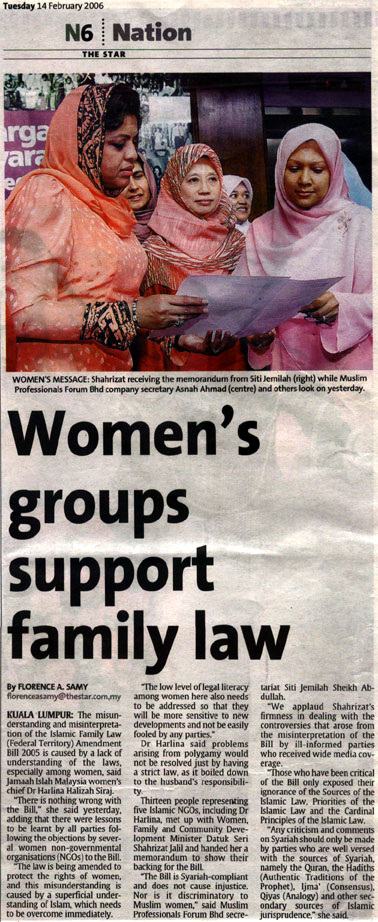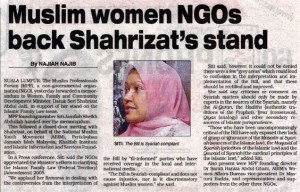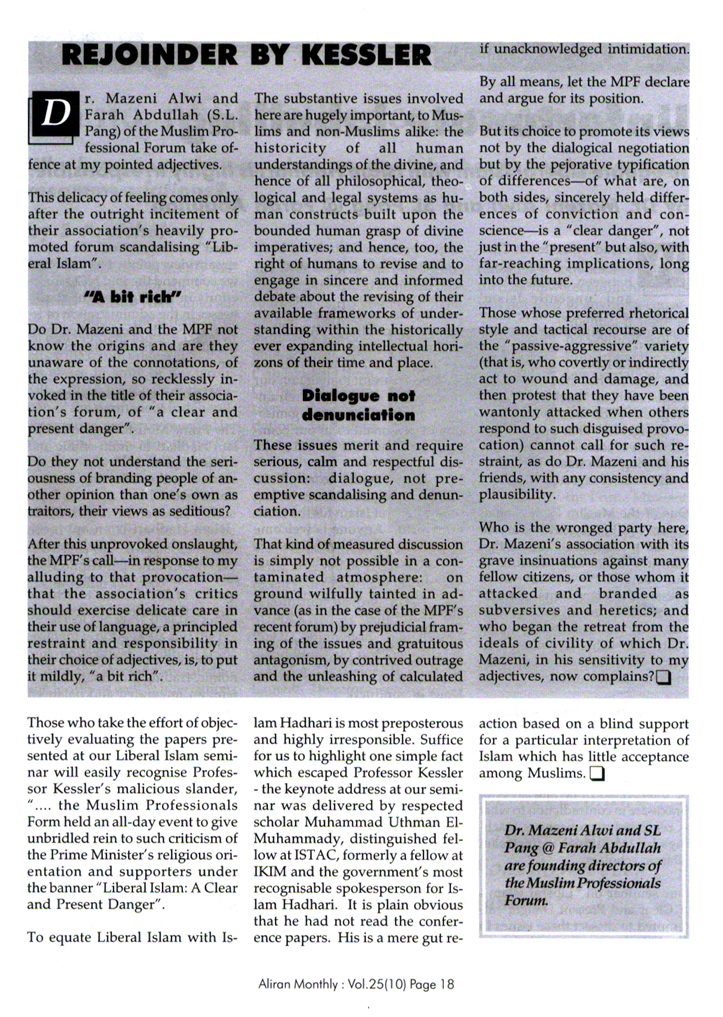Religious Pluralism
by Dr Musa Mohd. Nordin
The Editor
Malaysiakini
Dear Sir,
I enjoyed reading Chia’s rebuttal of my expose of pluralism (Religious pluralism – My daddy’s cool; 21 Oct 2005 ). It adds further colour to the spectrum of the theological discourse.
Despite our differing understanding and interpretation of religious pluralism, we nonetheless concur that John Hick remains the “guru” of the pluralist theology.
Amongst the modern scholars of theology, Hick is probably the foremost in paying meticulous attention to the issues of religious diversity and theorizing religious pluralism in such a profound manner. He has extensively elaborated his hypothesis of religious pluralism in virtually all of his scholarly works.
I must admit my disappointment at not being able to reference any of Hicks or for that matter other pluralist theologian’s writings or thoughts in my reading of Chia’s piece to substantiate his personalized inferences of the pluralist theology.
I can only benchmark my grasp of the pluralist theology against the writings of renowned scholars of religious pluralism , the likes of Ernst Troeltsch (1865-1923), William E. Hocking (Re-thinking Mission 1932), Arnold Toynbee (1889-1975), Wilfred Cantwell Smith (Towards a World Theology 1981) and John Harwood Hick et al. Chia’s would be his own variant, personal flavour or mutation of the pluralist model.
Hick wrote “Other religions are equally valid ways to the same truth”. Paul Knitter contends “All religions are relative – that is limited, partial and incomplete, one way of looking at something… Deep down, all religions are the same”.
In his contribution to the The Encyclopedia of Religion, Hick defined religious pluralism as “…the term refers to a particular theory of the relation between these traditions, with their different and competing claims. This is the theory that the great world religions constitute variant conceptions and perceptions of, and responses to, the one ultimate, mysterious divine reality…the view that the great world faiths embody different perceptions and conceptions of, and correspondingly different responses to, the Real or the Ultimate, and that within each of them independently the transformation of human existence from self-centeredness to reality-centeredness is taking place.” [Hick, John, ‘Religious Pluralism,’ in Eliade, Mircea (ed.), The Encyclopedia of Religion (New York: Macmillan Publishing Company, 1987), Vol. 12, p. 331].
Chia instead suggest that “If anything, pluralist theologians insist that the many religions are so radically different that we can never reduce them to some common denominator …”
He further posits that “it is not necessary that all religions have a similar goal. There could be different religious ends. There could be many summits or even many mountains, not necessarily only one.”
The pluralist truth claim asserts that all religions, theistic or non-theistic, can be considered as ways through which man can attain salvation, liberation and enlightenment. They all represent authentic responses to the same transcendent “Real” and are thus valid manifestations of the “Real”.
Herein lies the hidden yet clear danger of the pluralist truth claim. It is absolutist in the sense that it is all too eager to relativise all of the existing absolute religious truth claims. Epistemologically, relativising the truth claims implies (though rarely recognized by the pluralists) denying or at the very least degrading the absolute truth claims.
And as well exemplified by Chia, the pluralist daddy is the only and truly cool dude. The pluralist truth claim transcends the conflicting and relative truth claims among religions, claims a fa?ade of democracy and world peace and is the “absolute messiah” to the phenomenon of religious diversity. That is, the other religions daddies are not cool!
Chia’s historical analysis of the genesis of religious pluralism is na?ve and not evidence based. The religious pluralism discourse revealed itself as a purely Protestant phenomenon. It evolved within the Protestant reform movement, although the doctrine extra Christos nulla salus (no salvation outside Christianity) had remained etched in the Protestant theology till the end of the 19th century.
And according to Prof. Legenhausen, the idea of religious pluralism was an attempt to provide a theoretical foundation within Christian theology for tolerance of non-Christian religions. It evolved as a reform movement of religious thought, a liberalization of religion led by Friedrich Scleiermacher’s “Liberal Protestantism” in the 19th century.
It was developed further within the discourse of western philosophy and theology by Ernst Troeltsch, a liberal Christian theologian. The pluralist model was further shaped by the Canadian theologian, Wilfred Cantwell Smith who in his work Towards a World Theology, proposed a desperate need to breed a concept of universal or global theology that can best serve as a common ground for religions of the world to co-exist with each other in society peacefully and harmoniously.
John Hick reconstructed the theoretical basis of the pluralist theology, theorized and popularized it to such an extent that it has now become synonymous with his name.
The notion of religious pluralism is alien to Islamic ideological or theological framework. It began to encroach into Islamic thought after the second World War when Muslims were exposed to education in western traditions and hence the overt or covert onslaught of western cultural hegemony.
And the spread of this idea within the Islamic discourse has been partly encouraged by the works of Western Muslim mystics. Isa Nuruddin Ahmad better known as Frithjof Schuon emphasized in his book The Transcendent Unity of Religions, that deep down all religions are the same (esoterically they are the same); though their rules , morals and ritual may differ (exoterically different). He called this the Perennial Religion (Religio Perennis)
Syed Muhammad Naquib Al-Attas argues that the transcendent unity of religion is not found even at the esoteric level because each religion has exclusive or differing concepts of god. He adds, such transcendent unity cannot be deemed “religion” only religious experiences.
The schism within the pluralist tradition can be classified into 2 major planes of thought. Cantwell Smith, Hick et al mainstreamed the sociological concept of a pluralist global theology, whereby cultural identities and religious beliefs must evolve with the passage of time and within the context of post-modernism and globalisation.
Other pluralist theologians suggest otherwise. Their traditional religious philosophical nuances maintained that the many religions should not sacrifice their esoteric and sacral identities. Instead, these ought to flourish and each should not claim superiority over another. They embrace the “all paths lead to the same summit” theology. They include among others Rene Guenon, T.S. Eliot, Titus Burckhardt, Fritjhof Schuon, Ananda K. Coomarasamy, Seyyed Hossein Nasr et al.
Islam’s concept of al-Hanifiyah as elucidated in Pluralism “disguised enmity” of Religions, is the divine prescription towards all other non-Islamic religions. It allows “all the other religions” to be fully “others” without any reduction, deconstruction or relativisation. It acknowledges the plurality of religions and allows the adherents of all religions the plurality of laws to govern their lives within the aegis of their religious beliefs and principles. This is the gift of al-Hanifiyah to humanity.
Dr. Musa Mohd. Nordin
musa@mpf.org.my
Board Member, Muslims Professionals Forum
c/o Damansara Specialist Hospital
119 Jalan SS 20/10
Damansara Utama
47400 PJ
Tel/Fax : 03-77293173
Religious pluralism – ‘my daddy’s cool!’
Edmund Chia
Oct 21, 05 5:55pm
Dr Musa Mohd Nordin’s letter on religious pluralism is timely. Just a couple of weeks ago, a new book was released by Orbis Press, entitled The myth of religious superiority. It is the product of a conference held two years ago for those identified as ‘pluralist’ theologians or scholars of religion.
The participants came from different parts of the world and represented six of the world’s religions, including Islam. Two Malaysians were amongst them. This conference took place in the University of Birmingham, where Prof John Hick teaches. And yes, Hick (whom Musa rightly points out as the ‘icon’ of the pluralist model) was the host.
Anyway, coming back to Musa’s letter, I don’t think he has accurately represented the thesis of religious pluralism. To be sure, the pluralist model does not consider all religions as ‘relatively the same’. If it does then it is no longer pluralist.
Pluralism refers to that which is not-one, which means it is also not-same. If anything, pluralist theologians insist that the many religions are so radically different that we can never reduce them to some common denominator. Pluralism, therefore, is adamant that the uniqueness of each religion be accepted not only de facto but de jure.
In other words, religious pluralism is not merely a fact of life (to be tolerated or accepted since there is really nothing we can do about it) but something which is treasured and embraced as part of the design of the universe or the will of God/Truth/Allah (or whatever name one attaches to signify divinity or the Ultimate).
It is also equally inaccurate for Musa to suggest that pluralism is an ‘all paths lead to the same summit’ paradigm’. On the contrary, the pluralist model posits that it is not necessary that all religions have a similar goal. There could be different religious ends. There could be many summits or even many mountains, not necessarily only one.
In fact, a simple exploration of the various religions will reveal that they have very different understandings about the origins of life, the creation of the universe and especially what constitutes the final destiny of humankind. Concepts such as salvation, moksha, nirvana, paradise, etc. mean very different things to the different religions. It is too simplistic to consider them as referring to the same thing or leading to the same summit.
Next, it is also inaccurate for Musa to suggest that “religious pluralism was gestated within the context of western secular liberalism”. It is kind of like saying that Albert Camus was the inventor of nihilism just because he authored a book on the subject. Religious pluralism, to be sure, is something which many of us in Asia are very much used to. It is in our psyche.
Just consider the religious landscape in India and China. For millennia, the many religions have not only been allowed to coexist peacefully but the people have also been free to embrace and practice many of them all at once (at least until religion became politicised). There is no need for any one religion to dominate or to regard itself as superior to the others. Each religion can have its truth and faith claims. They are not a problem as long as they are kept within the community.
Problems arise when such truth and faith claims are used outside of the community and, especially, to pass judgment upon other people or another religion. This is more characteristic of the monotheistic religions (though not necessarily limited to them), where the belief in the one God leads to the belief in one truth, which leads to the conclusion that there can be only one true religion.
Of course, this true religion is always the one we belong to; for the Muslim it is Islam, for the Christian it is Christianity, and so on. The believer believes, in all honesty and sincerity, that it is his or her own religion which is that final, definitive, unsurpassable and absolute religion, while other religions are at best, lesser versions of this absolute religion or at worse, false or even demonic.
To support such exclusivistic attitudes the Muslim can turn to the Quranic verse: “He that chooses a religion other than Islam, it will not be accepted from him, and in the world to come he will be one of the lost” (Sura’ 3:85). Likewise, the exclusivist Christian can turn to the Biblical verse: “All authority in heaven and on earth has been given to me [Jesus Christ]. Go, therefore, make disciples of all the nations” (Mt. 28: 18-19).
When such convictions are paired with power (social, political, economic, etc.) it can be dangerous. History has enough examples of cases of violence perpetrated in the name of religious truth. If I believe God to be on my side, then I see it not only my right but also my duty to convince, persuade, entice, coerce or force you into accepting my religion.
Or, I may see it as God’s will that I subtly or actively persecute you and your religion or work towards its conquest and annihilation. Musa will probably quote Sura Al-Baqara v. 256 which says that there should be “no compulsion” in religion. The Catholic could also quote from Vatican II’s Declaration of Religious Freedom which states that everyone should be “immune from coercion” and that “no one is to be forced to act in a manner contrary to his own beliefs” (art. 2).
The problem is that the evidence do not bear this out. We have enough incidences of religiously- minded persons proselytising and discriminating against those who are not members of their own religion. A look at bookstores along Jalan Tuanku Abdul Rahman in Kuala Lumpur will reveal dozens of books which belittle Christianity. These are mainly written by Muslims or ex- Christians. Likewise, bookstores along Michigan Avenue in Chicago also have plenty of anti-Islam books. The authors are mainly Christians or ex-Muslims (some of whom even claim to have Islamic degrees from al-Azhar).
It is this latter dimension of absolute truth claims which the pluralist theologians are dead set against. Enough violence has already been committed in the name of these truth claims. It is not the truth claims which the pluralists preach against but how they are vulnerable to being exploited. If kept within their own community the truth claims are valid and good as they serve to nurture faith and a sense of commitment.
But when used as a weapon to condemn or to judge another, then it becomes problematic. Truth claims are meaningful only within the context of a relational experience, of the believer with the Divine and with one’s own religious community.
Truth claims are much like love claims such as a child telling his father that he is the “best daddy” in the whole world, or a man telling his wife that she is the most beautiful woman he’s ever seen. Such love claims and proclamations are not only valid but also necessary. They help deepen the relationship.
Moreover, they are also absolutely true, as far as the one proclaiming it is concerned. Likewise, truth claims are not only legitimate but also highly desirable. They distinguish one religion from another and help nurture the faith life of the believers.
But if the daddy is to use his child’s love claim and go around comparing himself to other fathers and making claims that he is indeed the ‘best daddy’ in the whole world and that others should emulate him or consider him as superior then problem arises.
Firstly, he will find out that other fathers who have also been told by their own children that they are indeed the ‘best daddy’ in the whole world. Secondly, such competitive judgements can only lead to enmity and hatred and not the compassion and love which religious truth claims ought to be generating.
This is what the pluralist theologians are concerned about. Theirs is not so much to deconstruct truth claims for deconstruction’s sake but to preach against the ‘myth of religious superiority’ for the myth has already contributed way too much to the inter-religious conflict and violence in the world.


